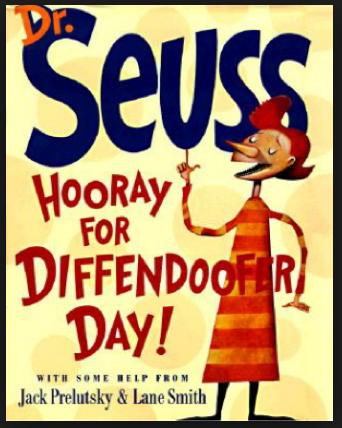
Hooray for Diffendoofer Day is about an outside-of-the-box kind of school staffed by appropriately named workers, such as the nurse, Miss Clotte, the custodian, Mr. Plunger, and three cooks named McMunch. Diffendoofer School teachers provide knowledge-based lessons mingled with some important skills not found on any list of standards:
Miss Bobble teaches listening, Miss Wobble teaches smelling,
Miss Fribble teaches laughing, and Miss Quibble teaches yelling.
The quirkiest teacher of all is the main character in the book:
My teacher is Miss Bonkers, she’s as bouncy as a flea.
I’m not certain what she teaches, but I’m glad she teaches me.
Of all the teachers in our school, I like Miss Bonkers best.
Our teachers are all different, but she’s different-er than the rest.
One day, Diffendoofer’s worried little principal, Mr. Lowe, makes a special announcement:
All schools for miles and miles around must take a special test,
To see who’s learning such and such- to see which school’s the best.
If our small school does not do well, then it will be torn down,
And you will have to go to school in dreary Flobbertown.
Like most of the children in Ohio’s public schools, Diffendoofer students are immediately stressed at the thought of taking such a high-stakes test, and they fret about the prospect of being removed from their beloved school and forced to attend monotonous Flobbertown, where “everyone does everything the same.” They continue to agonize over the test, until Miss Bonkers reminds them:
“Don’t fret,” she said, “you’ve learned the things you need
To pass that test and many more- I’m certain you’ll succeed.
We’ve taught you that the earth is round, that red and white make pink,
And something else that matters more- we’ve taught you how to think.” 
Of course, Miss Bonkers is right, and the students get “the very highest score” and pass the dreaded test using background knowledge, combined with the critical and creative thinking skills they acquired through a variety of innovative activities at Diffendoofer School.
The Ohio Legislature’s over-reliance on high-stakes testing for its public schools has forced many districts to re-focus their precious economic resources on hard copy and digital curricula that will aid them in teaching for the test. Could it be merely a coincidence that the same educational companies, that produce the tests and sell those testing resources, also contribute to the campaign coffers of some of the legislators who sponsor the “school reform” laws? One can only speculate.
In this test-driven era, Art, Music, and Physical Education programs have been slashed in many school districts. Field trips are no longer considered affordable. Schools are cutting way back on recess as well, hoping it will “give the students more time to learn what’s needed to pass the tests.”
It’s sad to see the demise of activities that round out our students’ knowledge-based learning with important critical and creative thinking, yet these are desperate times for many of our public schools, and they’re trying to get the most test-score bang for their bucks. Unfortunately, the continuation of this kind of programming will eventually lead to more schools like dreary Flobbertown, where everyone does everything the same.
Some of Ohio’s state education leaders understand what Dr. Seuss figured out more than two decades ago – continued high-stakes testing is taking its toll on our children, as well as on the institution of public education. The state school board has asked the Ohio legislature to wipe out three items that add a testing burden to teachers and students – the high school English I exam, WorkKeys tests for some career training students, and requirements that some tests be given just to evaluate teachers. http://s.cleveland.com/aPNVmbD
Many teachers and parents have urged the state to scale back state-mandated testing to the federal government’s minimum requirements, but State Superintendent Paolo DeMaria and state legislators have been reluctant to trim that far.
Judging by the lack of parent and teacher input incorporated into Ohio’s educational policy-making, the idea of cutting test-taking back to federal minimums may be no more than another children’s fable.

